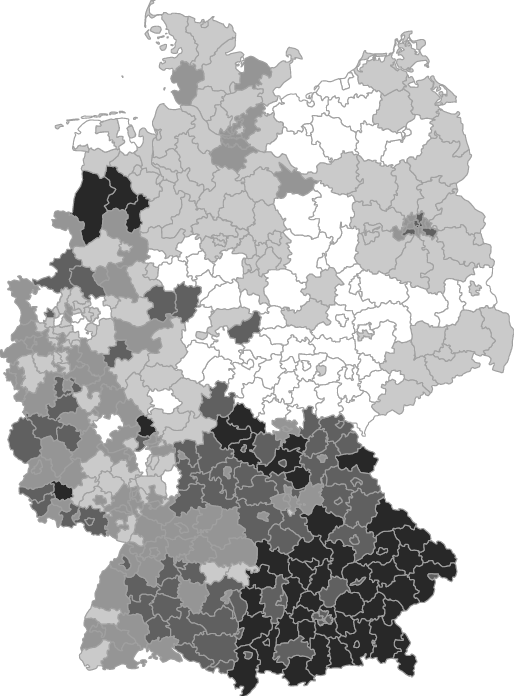Colleague Rainbow Murray is in Paris to do a little bit of observing. Her personal account of the count in one Parisian ward is quite intriguing. I had no idea that each candidate has to provides their own ballot paper. Not a very green thing, it would seem. Art Goldhammer puts Laurent Joffrin’s comment on Mélenchon’s failture/LePen’s success in perspective. ‘We all tend to overinterpret the results of elections’. Can’t argue with that. Meanwhile, Matt Goodwin ponders the question if Marine LePen’s ‘detoxified’ version of her father’s Front National is serving once more the blueprint for the (West) European Extreme Right, with Greece providing the counterpoint.And my own thoughts? Looking back, perhaps the most remarkable fact is how much our collective excitement has waned since the presidential election, although legislative elections really arereally important. Is this just because hundreds of multi-person races can simply not compete with the drama of the shoot-out between Sarkozy and Hollande, or just another piece of evidence of the internet’s detrimental effects on our attention spans?
Tag: elections
Mapping local deviations from regional voting patterns in Germany
Political Science is the magpie amongst the social sciences, which borrows heavily from other disciplines. These days, many political scientists are actually failed economists (even more failed economists are actually economists, however). I used to think of myself as a failed sociologist, but reading the proofs it dawned on me that I might actually aspire to become a failed geographer.
Putting candidates in their place with R
Counting the number of mainstream candidates living in a constituency is a point-in-polygon problem: each candidate is a co-ordinate enclosed by a constituency boundary. R function overlay from package sp carries out the relevant operation. Counting candidates and mapping their number is easy if you remember one thing: VECTORISATION
English Voters Prefer Local Candidates, Ceteris Paribus
The effect of geographical distance between candidate and voter on vote likelihood in the UK is essentially untested. In systems where constituency representatives vie for local inhabitants’ support in elections, candidates living closer to a voter would be expected to have a greater probability of receiving that individual’s support, other things being equal. In this paper, we present a first test of this concept using constituency data (specifically, notice of poll address data) from the British General Election of 2010 and the British Election Survey, together with geographical data from Ordnance Survey and Royal Mail, to test the hypothesis that candidate distance matters in voters’ choice of candidate. Using a conditional logit model, we find that the distance between voter and candidates from the three main parties (Conservative, Labour and Liberal Democrat) matters in English constituencies, even when controlling for strong predictors of vote-choice, such as party feeling and incumbency advantage.
Snap Election in North Rhine-Westphalia
Much to everybody’s surprise, the minority government in North Rhine-Westphalia collapsed today. Minority governments are a rarity in Germany. The federal constitution, reflecting Germany’s inter-war experience of unstable governments and intense political strife, practically rules them out. Constitutional details at the state level differ but the general assumption is that the government needs the reliable…
Sports Cars, Sleaze and Gamma Rays: Rhineland-Palatinate Elects Its FirstRed-Green Government
Just under one year after the fact, here is my analysis of the latest election in Rhineland-Palatinate.
The 2011 election in Rhineland-Palatinate was a political earthquake: Following a string of political scandals, the SPD lost almost ten percentage points of their support, while the CDU could hardly improve on their disastrous 2006 result. The FDP is no longer represented in the state parliament. The Greens more than tripled their last result, allowing them to enter a coalition with the SPD for the first time.
Analyses at the municipal level show that the party improved most in their urban strongholds while still showing a (relatively) weak performance in rural areas. This will make it difficult to sustain the momentum of their victory. Moreover, the SPD is battered and bruised and needs to select a new leader, but veteran minister president Kurt Beck shows no inclination to step down. This does not bode well for a coalition that needs to organise the state’s fiscal consolidation and structural transformation.
Just out: Backes/Moreau (Eds) The Extreme Right in Europe
Like a premature Christmas present, my author’s copy of “The Extreme Right in Europe” arrived before the weekend. It’s a hefty volume of almost 500 pages that comes with a equally hefty price tag of just under 80 Euros. As you can see from the table of contents (the PDF also contains the introduction and…
Election Roundup: Poland and Denmark by Stanley and Christensen
Life as an early 21st century comparativist is good: Skim through the English literature on country X, Y, and Z, get the dataset from some institution’s website, run the models on a superfast computer, and hey presto, you’re done. More often than not, one might be tempted to skip the literature bit completely and simply…
Miniskirts and Genocide: Inside the Topsy-Turvy World of NPD Propaganda
In the olden days, the world was simple. The average extreme right party was strictly socially conservative, to say the least. Abortion and homosexuality were considered sinful, mostly so because both practices deprived the fatherland of future soldiers and potential mothers of even more soldiers. So sex was supposed to be intramarital and had one…
Is this Political Science gone mad? Tactical voting and the tabloids
Being a political scientist is not considered an exciting occupation by people who have a life, and as party conversation topics go, electoral systems are pretty lousy. But with LibDem support somewhere in the high 20s (if the polls are to be believed), normal people start to wonder why 26% of the vote should give…
